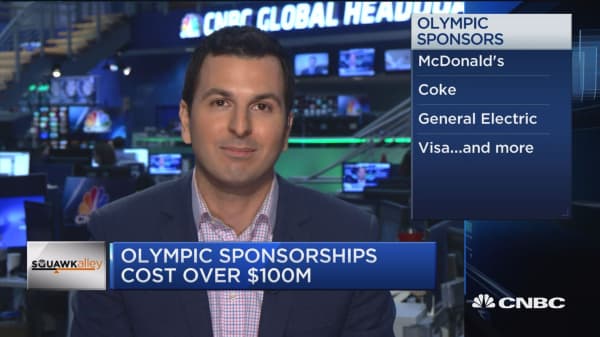Some companies are turning "hashjacking" into an Olympic sport.
In the weeks leading up to the Rio summer games, the U.S. Olympic Committee has been going after companies, telling them they can't use "official" hashtags like #Rio2016 and #TeamUSA on Twitter. That's according to reports in media outlets including ESPN and The Guardian.
Of course, official Olympic sponsors — like Coca Cola and Hershey — don't have that restriction. They just tweet out whatever they want. It's other companies that are being told they can't use the hashtags for any reason. Even wishing athletes good luck is out of the question.
But really, how big of a problem is this? Legal issues aside, hashtags on social media are meant as a tool for the public to join in on a conversation however they want. They provide a central theme, allowing for people to find tweeters talking about a topic in real time as well as indexing conversations to be accessed later.
The USOC is objecting on legal grounds to Olympic-level versions of "hashjacking," a term coined to describe the usage of a hashtag for something different from its intended purpose.
The USOC owns trademarks on many words and phrases used for the Olympics, including "train like an Olympian," "naturally powering team USA" and "go for the gold." But it seems to be "Rio2016" and "TeamUSA" that the USOC is most concerned about protecting.
While the USOC holds trademarks on these terms, it's unlikely to come after individuals tweeting out their enthusiasm for the games. They're more concerned with confusion between an athlete's personal sponsor and an official Olympic sponsor.
A lot of the USOC's complaints have been directed at companies that have relationships with Olympic athletes but aren't official sponsors of the games themselves. Oiselle, which makes women's athletic clothes, got the letter after posting images of Kate Grace, who will run the 800 meters for the U.S. track team.
"The whole thing is ridiculous," said CEO Sally Bergesen, according to ESPN. Oiselle blurred parts of the images that showed Olympic property, but left the blog posts up.
Many other companies use the hashtags in a totally non-official sponsor way, and often totally non-Olympic. The WWE, for example, used #TeamUSA in the July 4 broadcast when a team of American wrestlers faced a team of international ones. That #TeamUSA got used in a set of Tweets.
WWE tweet
It's not clear if the USOC reached out to WWE to request it stop using the phrase (both organizations did not respond to requests for comment). But it was the last time those tweets — or that team of wrestlers — were seen.
WWE might have been the most flagrant misuser of #TeamUSA recently, according to metrics from social media intelligence firm Brandwatch. The company runs different data analytics to understand the usage dynamics of Twitter and other social platforms.
According to Brandwatch's data, the WWE had the most impact on social media using that hashtag in the month of July. "Impact" in this case is a metric constructed from the number of followers a particular account has, the number of times it uses that hashtag and the reaction received from those tweets.
Brandwatch found a surprising number of companies tweeting "#TeamUSA" that were not official sponsors of the Olympics. What's additionally intriguing is these companies would often issue a single tweet — only never to use the hashtag again. That could mean that the USOC "police" were out and about, actively finding violators and cracking down.
GiordanosPizza tweet
Girlscouts tweet
This tweet was retweeted from Jamba Juice's official account:
JambaJuice tweet
BankoftheWest tweet
Our review of Brandwatch's data suggests that with the exception of the official sponsors and media outlets, most companies really are avoiding these hashtags, either because they've been too afraid to get involved, or because the USOC lawyers have been effective at tracking them down and telling them to stop.





